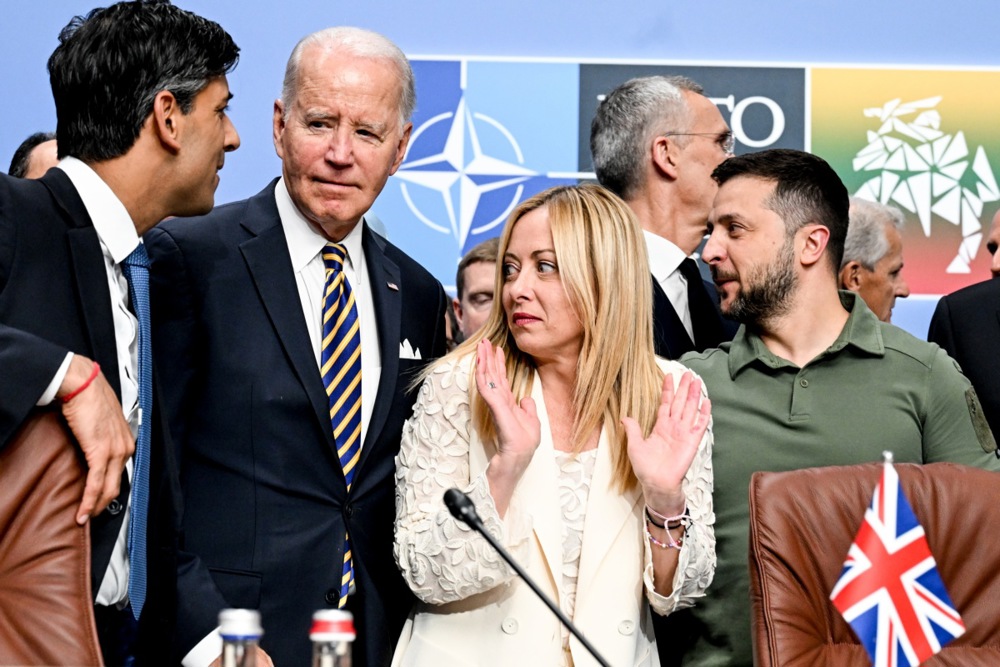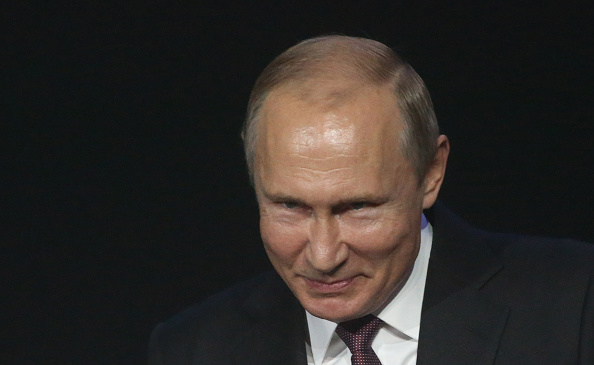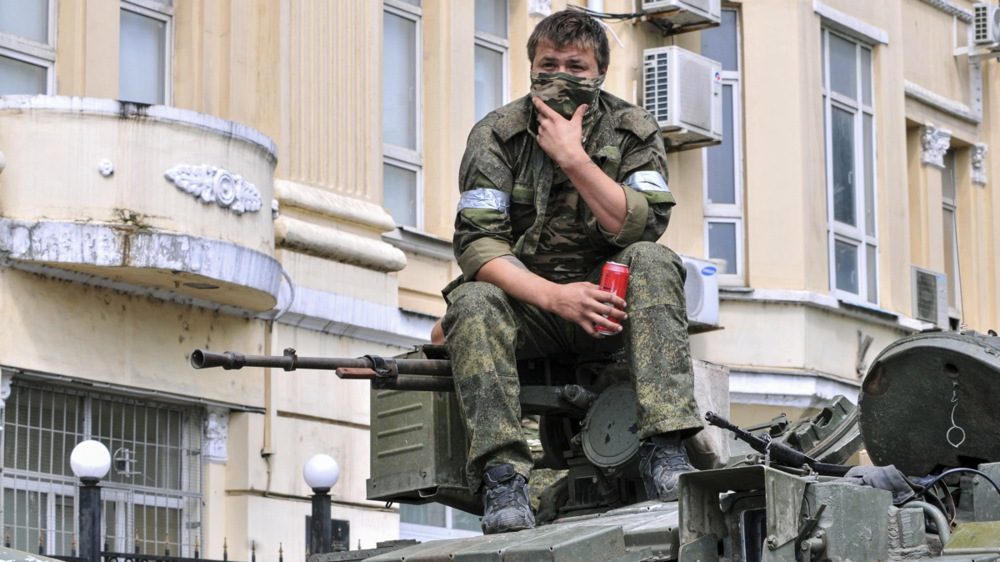For 75 years, NATO has defended the free nations of the Euro-Atlantic region and provided the shield behind which prosperity could flourish.
The European Union fancies itself the bringer of peace in Europe but it was NATO arms – chiefly American – which made that possible. As economic and political liberalisation expanded Eastwards, Allied protection followed – by request of the new countries concerned, rather than by imposition from the West.
Those who made it through the NATO door in time – such as Romania, geographically the Alliance’s Easternmost European member – are now thanking their good fortune. And even those who had purposefully stayed out, such as Finland and Sweden, have now sought NATO cover.
The Russian threat
Ukraine’s fate proves the whole point of the Alliance: that we may hope for a benign Russia, as some did after the Cold War, but we cannot be sure. So we cannot let our guard down – because the price of being wrong could be devastating.
Those who still argue that NATO should have been rolled up together with the Warsaw Pact and that NATO expansion “provoked” Russian aggression, mistake cause for effect and confuse theory with facts. Russia has always been aggressive when powerful and aggrieved when weak. At its low points it plots its comeback; on the upswing, it wants more.
In theory there may have been an opportunity, after 1992, to “liberalise” Russia and bring it into the Western fold. But even the very framing of this idea, as something to be done to Russia from the outside, betrays its naivety.
The fact is that Russia is fundamentally an imperial State that has never relinquished this mindset, not least because it never had to, whether by force or by reason. Europe’s other empires succumbed to reform (Britain after 1947), conquest (France formally 1871, the Ottomans and Austria-Hungary 1918, Germany 1945), or a combination of the two (Germany 1918, with defeat instead of conquest and democratic revolution instead of reform).
But modern Russia, despite defeats, was never conquered; and its vile October revolution preserved – indeed, compounded – the State’s imperial instinct. And imperial States – China is another, so is Iran – have a completely different understanding of the meaning of “legitimacy” in the international system.
This is why Russia, even starting from the diminished position it had after the fall of the USSR, was always going to try to restore as much of its former status as it could. Moscow was bound to pursue this course, by its history, culture and self-identity, irrespective of where NATO’s frontier was. Indeed, before Crimea it struck at Georgia in 2008, without any real NATO-related justification.
The Russian threat, whether latent or active as at present, has and will remain a constant feature of life on the European continent. The Kremlin’s power may ebb and flow but the Russia of President Vladimir Putin and whoever succeeds him, will not disappear or alter its fundamental disposition. There is no break-up coming, no democratic revolution and not even the famed Chinese “occupation” from the East. There will only be more of the same.
NATO turning point
By contrast, NATO is at a real turning point. Too often the Alliance’s successes since February 2022 are over-hyped in public debate. Self-satisfaction can breed complacency.
In fact, the record is more mixed. Indeed, NATO overall has done well to maintain political unity, assure its members and co-ordinate vital support for Ukraine. The military posture is being strengthened significantly and defence spending is going up. Notably, Finland and Sweden have joined the alliance.
But it is also the case that the military help to Kyiv has been provided by individual NATO members, in very unequal quantities. The problems of supplying Ukraine are well known, as is the problematic state of the defence industry base across Europe in particular – and of European arsenals.
The Alliance is also strongly dependent on US military capabilities, including in the nuclear domain; former US president Donald Trump’s likely return to the White House could be very destabilising for NATO and it will have to be handled with care by figures Trump already knows and ideally trusts.
Finally, for all of Ukraine’s heroic fight and its allies’ commendable help, the big picture from a NATO point of view remains fraught with great risks and uncertainties. Putin’s war continues to tear into Ukraine and NATO allies are divided on the best way forward.
The French President Emmanuel Macron talks of Western military intervention, the Hungarian Prime Minister is for an immediate ceasefire, the German Chancellor tries to balance aid with caution and the policy of the “leader of the free world” is held hostage by US Congress. Meanwhile, the Russian military machine creeps forward and grinds down the brave Ukrainian resistance.
The Eastern imperative
It is in this context that NATO now also has to decide on a new Secretary General, to be announced at the major July summit in Washington. After a decade-long tenure, the well-regarded current NATO chief Jens Stoltenberg will step down at the end of September.
Who should replace him? In many quarters, this is not even a question anymore. It is known that the Dutch Prime Minister Mark Rutte has already received the all-important “blessing” from the White House and that he also has the support of the UK, France and Germany. He seems to be a shoe-in, because, usually, all other allies tend to align with the choice of the big Western powers in NATO, particularly the US.
But we are living in very unusual times. The vast war raging on NATO’s Eastern frontier makes all the difference and could well change the political game within the Alliance, especially on such a sensitive question as the Secretary General post. It is very likely that NATO’s Eastern members will finally seize the moment and push one of their own into the top job.
They certainly have powerful arguments on their side. To start with, in 30 years since the end of the Cold War, Eastern European States have not held the leadership of the Alliance even once. In this interval, they have come a very long way, collectively, in economic and political terms.
Their “apprenticeship” in NATO is long completed and they cannot be overlooked anymore without a serious political cost and, therefore, without placing alliance unity in jeopardy. Plus, this would be a gift to Russian propaganda, which is keen to project the Eastern Europeans as “second-class” members of NATO. In such a case, it wouldn’t even be far off the mark.
Secondly, Eastern Europe’s role as NATO’s first line of defence against Russia is no longer theoretical. The Ukraine war has brought this reality home to European capitals and publics in a way that a mere look at the map before 2022 could not have done.
Eastern Europe, which is also seeing the highest rates of defence spending across the Alliance, is now the guardian of the West against an active threat. It would be the first to suffer if, God forbid, Ukraine’s defences fail. Eastern Europe – particularly Romania, which is the most exposed – bears the greater share of the risk of destruction, in case of further war.
This should translate into a powerful negotiating position. The idea that Western capitals should impose their own choice – especially an ultra globalist insider like Rutte – on the East as if it’s the early 2010s and nothing’s happened, should be unacceptable to any self-respecting East European leader, indeed to any sensible leader anywhere in NATO.
Thirdly, appointing a Secretary General from an Eastern-flank country would strengthen NATO deterrence by signalling to Putin that the Alliance’s commitment to its exposed Eastern members is truly ironclad politically.
This is more important than often realised because one of the key assumptions in Russian policy – and one of their main propaganda lines – is that these weaker, ex-Communist and newer members of the Alliance are merely the “lapdogs” (and “colonies”) of the West, with no agency of their own and acting at America’s direction.
In the Russian mind, this perspective is also confirmed by history as many of these Eastern European countries have been used as bargaining chips in the past, often between Russia and Germanic or Ottoman empires.
This Russian way of thinking, with its highly dismissive attitude towards the East Europeans, is not dissimilar to how Moscow viewed Ukraine before the war. It leads to miscalculations and can incentivise Putin to try his hand further in Eastern Europe if he thinks the West would prefer to cut a deal with Russia at the expense of these countries if it comes to a major crisis.
An Eastern European taking charge of the entire Alliance would, therefore, likely be a rather big shock to Russia. It would certainly collapse a great part of the Kremlin propaganda’s message directed at the Eastern-flank nations. Most importantly, it would contribute to an enhanced NATO deterrence in the region.
The fourth argument in favour of a Secretary General from the Eastern members of the alliance has to do precisely with that: geographical and thus cultural proximity to Russia. These countries’ establishments have a deep understanding of the full nature of the Russian threat and can draw on a long and unfortunate historical experience in dealing with Russian imperialism.
These are the kinds of insights that cannot be simply picked up from books. With Putin waging war on our doorstep, a serious and sophisticated personal understanding of Russia and the Russian mindset should be an essential qualification for the top job in NATO at this point in time.
There will be difficult debates to be had within the Alliance in the months and years ahead, reluctant allies to be persuaded, hard decisions to be taken. When the going gets tough in discussions around the NATO table – as it will – having a Secretary General at the helm who can speak with the authority and insight of an Eastern European will be invaluable – and could make the difference at a certain point.
Divisive Kallas
Only two figures from Eastern Europe are seriously in contention for the post. One is Kaja Kallas, the Estonian Prime Minister with something of a rockstar – or, rather, Taylor Swift – appeal to much of Europe’s liberal classes and NAFO types. She has pushed defence spending to over 3 per cent of GDP (although in cash terms it only amounts to little more than €1 billion) and, since 2022, has also sent military aid to Ukraine worth some 1.3 per cent of Estonia’s GDP. It is a brave effort from such a small country.
But Kallas is dogged by a major political scandal related to her husband’s involvement with a company that kept doing business in Russia even after the war broke out. Her party has tanked in the polls and almost 70 per cent of voters were asking for her resignation only a few months ago. Despite clinging on to the leadership of her own party, this kind of political baggage, particularly as it relates to Russia, should rule her out from the NATO race.
The other downside of the Kallas option for the top NATO post is her extremely hawkish positioning on Russia and the Ukraine war. She stands firmly in the camp of those who reject any notion of peace with Russia until Ukraine gets back all of its lost territories. She also wants a full, outright confiscation of Russia’s national assets frozen in Western banks since the war and immediate, full NATO membership for Ukraine.
But what should truly disqualify Kallas from a NATO SecGen bid is her clear endorsement of Macron’s highly irresponsible suggestion that NATO might intervene in Ukraine with regular troops. (Incidentally, the Polish foreign minister has also taken this line, which should likewise rule Poland out of any consideration for the NATO post, if it even tried.)
With the UK, US, Germany and others thankfully coming out against the Macron lunacy, Kallas now makes an even sharper contrast with the general mood in the Alliance and with leaders who have a firmer grip on reality. Backing NATO boots on the ground in Ukraine – a policy that would all but guarantee escalation and an outright war with Russia – shows appallingly poor judgement even when accounting for Kallas’ “young and in a hurry” esprit. Alas, this is not the time for NATO to experiment with its top position.
The only choice
In these circumstances, both by a process of elimination but also on his own merits, the only sensible choice for NATO Secretary General is Romania’s President Klaus Iohannis, who formally entered the contest on Macrh 13. Although less known on the world stage – not many previous SecGens had been – he is an efficient and quiet operator and he comes with some rather powerful credentials.
Firstly, he has run Romania, a frontline NATO state, for a decade – under the constitution the president decides on national security and foreign policy – and he is one of Europe’s most experienced statesmen currently in office. When Iohannis was first elected, Barack Obama was still US president; and he has maintained very strong relations with America under Trump and President Joe Biden as well.
Domestically, Iohannis is often criticised for his aloof manner and laconic style. But, in practice, he has proven himself a highly effective and flexible politician, keeping a strong grip on power by reforming governments at key moments. In 2021 he even oversaw the creation of a Left-Right coalition on the German model, an important political skill which would be vital in managing the politics of NATO.
Iohannis has two further achievements to his credit. One is that, throughout his time as President, he has kept Romania firmly on the democratic, pro-Western path, through some difficult political times both at home and regionally. It is also a fact that the country’s GDP has doubled during his leadership (although not necessarily because of it).
His other – and principal – accomplishment relates to defence. Right from 2015, Iohannis engineered a 10-year cross-party national agreement for Romania to meet the NATO 2 per cent defence spending target. Recently, the budget has reached 2.5 per cent. Many other NATO countries, such as Rutte’s Netherlands, remain “delinquent”.
Tens of billions’ worth of cutting-edge military equipment, overwhelmingly US-made, has been ordered or already purchased for the Romanian armed forces, from F-16 fighters (and in the future, F-35s) to HIMARS rocket artillery, Patriot-missile defence batteries and Abrams tanks. Together with the US and other allied forces – including French – deployed on national soil, Romania’s defence outlook has been deeply transformed under the Iohannis leadership.
In relation to Ukraine, he has overseen one of the most distinctive policies in NATO, one which speaks to some of the skills and approach that he could bring to the SecGen post.
By Ukraine President Volodymyr Zelenskyy’s own and repeated statements, Romania has been one of the main backers of Kyiv in its fight, right from the critical initial days of the war. Both countries use similar Soviet-designed equipment and ammunition, and Romania was able to transfer significant quantities of these from its own stocks, keeping Ukraine in the fight.
But none of Romania’s military aid to Ukraine has ever been acknowledged and Bucharest has never joined in the very public debates and detailed discussions on support for Kyiv conducted in Europe. Iohannis judged it more appropriate for Romania to help Ukraine quietly but effectively, even at the expense of international recognition.
Finally, Iohannis would bring to the NATO post something that no one else can: a unique personal profile as an ethnic German from Transylvania who speaks for Eastern Europe but is also, by birth and heritage, connected to the West. At a time of growing divisions between the two sides of the NATO alliance, such an attribute in the person of the Secretary General would be rather welcome.
NATO needs an experienced, politically astute and level-headed person at the top of the organisation and certainly someone with an impeccable track record on defence spending – the key concern particularly for Trump, if he were to return to the White House.
Most importantly, the next NATO chief must come from Eastern Europe. Not only because it is the region’s turn, politically, to lead the Alliance; but also because these are the countries that are taking on the greatest risk as NATO confronts Russia, and they can provide vital insights about this ancestral adversary at a critical time.
When surveying the field, only one viable choice stands out; Iohannis would make an excellent Secretary General.
Gabriel Elefteriu is deputy director at the Council on Geostrategy in London and a fellow at Yorktown Institute in Washington, D.C.






Has Russia identified a weak spot on Nato’s eastern flank? The drone strike on Reni port was a political attack on Romania